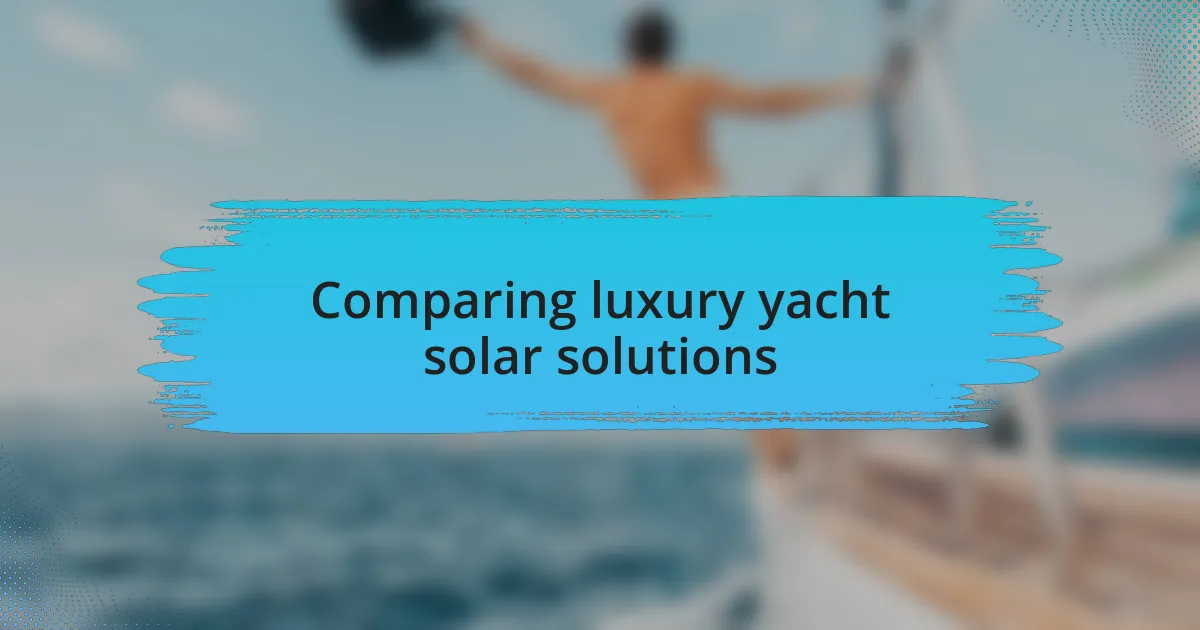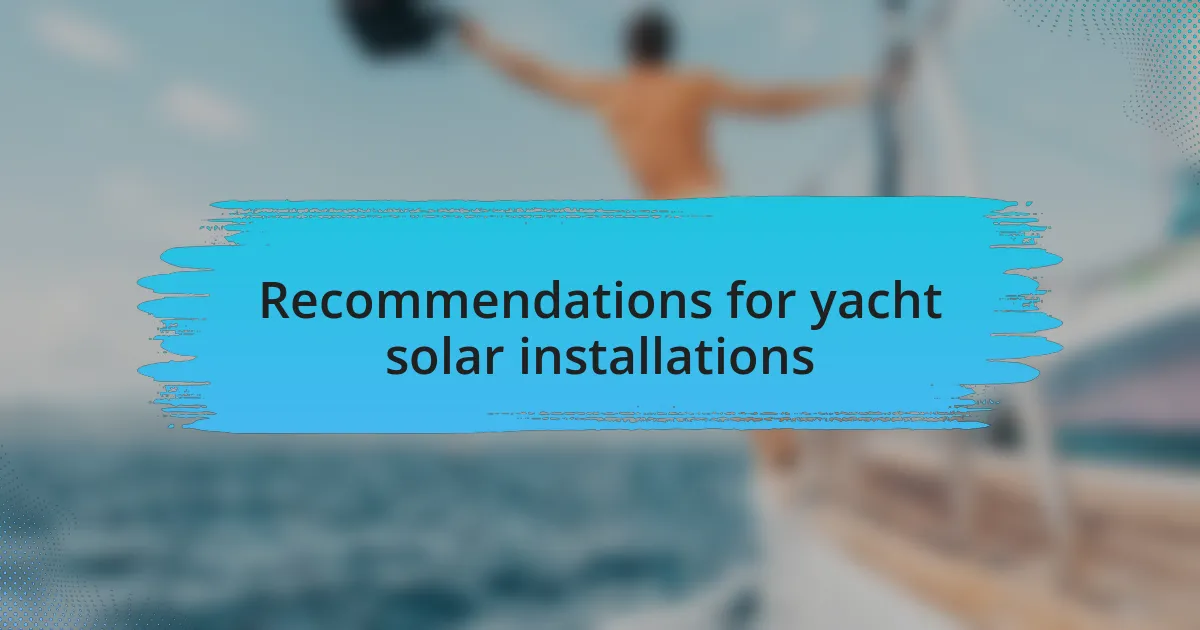Key takeaways:
- Choosing the right solar panels involves balancing efficiency, aesthetics, and compatibility with the yacht’s electrical system to enhance the cruising experience.
- Real-world performance of solar panels in marine conditions is more critical than advertised metrics; practical reliability matters for effective energy generation.
- Utilizing lightweight, flexible panels and investing in monitoring systems can significantly improve efficiency and energy management on board.
- Positive customer service experiences can enhance confidence in brand reliability and performance during critical moments at sea.

Understanding solar panels for yachts
When I first considered solar panels for my yacht, I was amazed at how they could transform my cruising experience. The idea of harnessing the sun’s energy to power my appliances while gliding through serene waters was exhilarating. How freeing would that be, to rely less on the engine and enjoy the gentle sounds of nature without the constant hum of a generator?
Understanding how solar panels work on yachts goes beyond just installation; it’s about compatibility with your onboard systems. From my experience, choosing the right inverter and battery setup is crucial for maximizing efficiency. Have you ever thought about how the sun’s position affects your solar output? I found that positioning my panels at the right angle at different times of the year made a world of difference in performance and energy collection.
It’s also essential to consider the aesthetics of solar panels on luxury yachts. I remember feeling torn between functionality and design. I wanted something that blended seamlessly with the yacht’s sleek profile. In the end, I found sleek, low-profile panels that provided a perfect equilibrium between power generation and aesthetic appeal—because who says sustainable choices can’t be beautiful?

Comparing luxury yacht solar solutions
When comparing solar solutions for luxury yachts, I discovered a wide range of options that cater to varying needs. Some brands offer high-efficiency panels that optimize space on a sleek yacht’s deck, while others prioritize durability and weight. I remember standing at the boat show, overwhelmed by choices, wondering which panel would provide the best balance of power output and aesthetic appeal.
One notable experience I had was testing different brands through firsthand use. I found that while certain panels promised incredible wattage, their real-world performance often fell short when faced with marine conditions. It was enlightening to see that the usual metrics aren’t everything; practicality and reliability under the sun’s glare mattered more during my voyages than the flashy numbers on a brochure.
As I delved deeper into solar system design, I realized that integration with the yacht’s electrical system was paramount. I learned firsthand the importance of combining the right solar chargers and batteries to maximize energy capture. Have you ever been anchored for days? It’s a revelation to wake up to fully charged devices because the solar setup works seamlessly, allowing you to fully enjoy the experience of being at sea without the constant concern of running out of power.

My personal experience with brands
When I first began comparing solar panel brands, one stood out due to its focus on aesthetics. I remember a moment on my yacht, admiring the sleek, dark surface of the panels from different angles. It was more than just functionality; it was about how they fit with the elegant lines of my vessel. Did I choose impressive-looking equipment over sheer performance? Perhaps, but it turned out to be a decision I didn’t regret.
Another eye-opening experience came when I switched brands mid-season, going from a less reliable option to one that was highly recommended. I’ll never forget the relief I felt when I finally had consistent power while exploring the open waters. Instead of worrying about my battery level, I found freedom in knowing my solar system was efficiently converting sunlight into energy. Isn’t that a thrill? That switch not only enhanced my journeys but also reignited my passion for sailing.
One brand’s customer service particularly impressed me during my comparisons. After installing their panels, I encountered a technical issue, and their responsiveness made a significant difference. I was surprised by how attentive they were, helping me troubleshoot without making me feel like just another number. Have you ever had a brand that stood by you when challenges arose? Well, that experience solidified my confidence in choosing their products moving forward.

Recommendations for yacht solar installations
When considering solar installations for your yacht, I highly recommend looking into the power-to-weight ratio of the panels. I recall the first time I lifted a solar panel to place it on my deck; it was surprisingly lightweight, which made installation a breeze. Not only does this enhance ease of setup, but it also ensures optimal performance without overloading your yacht’s structure. Have you ever worried about how much extra weight can impact your sailing? I have, and that’s why selecting lightweight panels made so much sense for me.
Another aspect to keep in mind is versatility in panel orientation. I learned this the hard way when I installed my panels at a fixed angle. It limited their efficiency, especially on cloudy days. After adjusting to adjustable mounts, the energy output skyrocketed, and I was thrilled with the results. Have you ever experienced the frustration of insufficient power when you need it most? That change in installation made all the difference in my cruising experience.
Lastly, investing in a robust monitoring system should be a priority. I remember checking my solar output and feeling a sense of control, knowing exactly how much energy was being generated in real-time. This not only allowed me to manage my usage better but also gave me peace of mind while sailing. Doesn’t having that level of knowledge transform your onboard experience? I can confidently say that making this small investment opened up a world of efficiency.